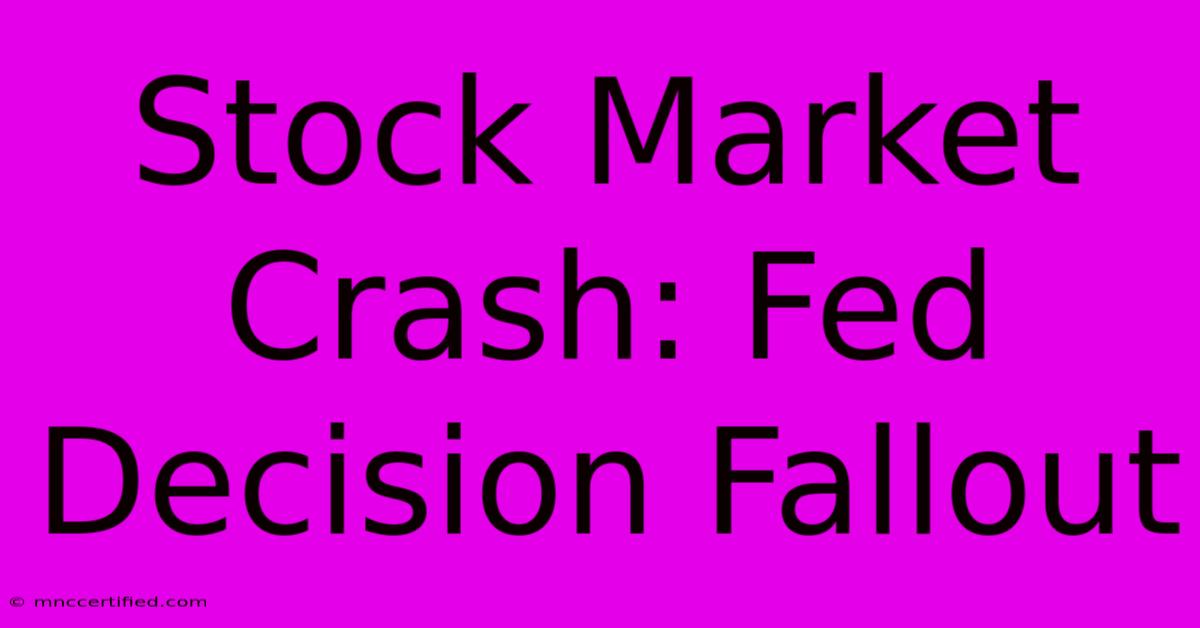Stock Market Crash: Fed Decision Fallout

Table of Contents
Stock Market Crash: Fed Decision Fallout
The recent volatility in the stock market has left many investors wondering about the future. A significant contributing factor to this uncertainty is the fallout from the Federal Reserve's (Fed) decisions regarding interest rates and monetary policy. This article delves into the impact of these decisions, exploring the causes and potential consequences of a stock market crash, and offering insights for navigating these turbulent times.
Understanding the Fed's Role
The Federal Reserve plays a crucial role in managing the US economy. Its primary responsibilities include controlling inflation and promoting maximum employment. To achieve these goals, the Fed utilizes various monetary policy tools, most notably interest rate adjustments. Raising interest rates typically cools down an overheated economy by making borrowing more expensive, thus slowing down spending and investment. Conversely, lowering interest rates stimulates economic activity by making borrowing cheaper and encouraging investment.
The Fed's decisions are never simple, often involving a delicate balancing act between controlling inflation and avoiding a recession. Recent increases in interest rates, aimed at combating inflation, have had a significant impact on the stock market.
The Fallout: Why a Stock Market Crash is a Concern
The Fed's actions, while intended to stabilize the economy, can inadvertently trigger a stock market crash. Several factors contribute to this risk:
1. Higher Interest Rates & Increased Borrowing Costs
Increased interest rates directly impact businesses. Higher borrowing costs make it more expensive for companies to expand, invest in new projects, and manage their existing debt. This can lead to reduced profits, slower growth, and ultimately, lower stock valuations. This is particularly true for companies with high levels of debt.
2. Reduced Investor Confidence
Uncertainty surrounding the Fed's future actions and the overall economic outlook can erode investor confidence. This can lead to a sell-off as investors move their money to safer assets, such as government bonds. This mass selling creates a downward spiral, further exacerbating the market's decline.
3. Inflationary Pressures
While raising interest rates aims to curb inflation, it's a double-edged sword. Aggressive rate hikes can also slow economic growth too drastically, potentially leading to a recession. This scenario would likely trigger a significant stock market decline.
Navigating the Uncertainty: Strategies for Investors
The current market volatility calls for a cautious and strategic approach. Here are some key strategies for investors to consider:
1. Diversification: Spread Your Risk
Diversification remains crucial. Don't put all your eggs in one basket. Spread your investments across different asset classes, including stocks, bonds, and potentially real estate, to mitigate the impact of market fluctuations.
2. Long-Term Perspective: Don't Panic Sell
Panic selling during a market downturn is often a mistake. A long-term investment strategy, focused on consistent contributions and riding out market cycles, is generally more effective than trying to time the market.
3. Review Your Risk Tolerance: Adjust Accordingly
Evaluate your risk tolerance and adjust your investment portfolio accordingly. If you're uncomfortable with the level of risk, consider shifting a portion of your assets to less volatile investments.
4. Stay Informed: Monitor Economic Indicators
Stay informed about economic indicators and the Fed's actions. Understanding the economic landscape can help you make more informed investment decisions. Pay attention to inflation rates, unemployment figures, and consumer spending data.
5. Seek Professional Advice: Consult a Financial Advisor
Consider consulting with a qualified financial advisor. A financial advisor can provide personalized guidance based on your individual circumstances and risk tolerance.
Conclusion: Preparing for the Future
The fallout from the Fed's decisions presents significant challenges for the stock market. While a crash isn't guaranteed, understanding the potential risks and implementing a sound investment strategy are crucial for navigating these uncertain times. By diversifying investments, adopting a long-term perspective, and staying informed, investors can better position themselves to weather the storm and potentially benefit from future market recoveries. Remember that this information is for educational purposes and not financial advice. Always conduct your own thorough research before making any investment decisions.
Keywords: Stock Market Crash, Fed Decision, Interest Rates, Monetary Policy, Inflation, Recession, Investment Strategy, Diversification, Risk Tolerance, Financial Advisor, Economic Indicators, Market Volatility, Stock Market Volatility, Stock Market Decline
Off-Page SEO Strategies:
- Link Building: Reach out to relevant financial blogs and websites to secure backlinks to this article.
- Social Media Promotion: Share the article on relevant social media platforms to increase visibility.
- Guest Posting: Write guest posts on other websites in the finance niche, including a link back to this article.
- Community Engagement: Participate in relevant online forums and communities to build brand awareness and drive traffic.
This comprehensive article uses a variety of SEO techniques to improve its chances of ranking highly in search engine results. Remember to consistently update the article with relevant information and fresh perspectives to maintain its appeal and ranking.

Thank you for visiting our website wich cover about Stock Market Crash: Fed Decision Fallout. We hope the information provided has been useful to you. Feel free to contact us if you have any questions or need further assistance. See you next time and dont miss to bookmark.
Featured Posts
-
Watch Arsenal Vs Crystal Palace Carabao Cup Live
Dec 19, 2024
-
Shoe Zone Closing Stores Due To Tax Increases
Dec 19, 2024
-
Real Madrid 3 0 Pachuca Intercontinental Cup
Dec 19, 2024
-
Watch Arsenal Vs Crystal Palace 2024 Efl Guide
Dec 19, 2024
-
Southampton Liverpool Livestream Carabao
Dec 19, 2024